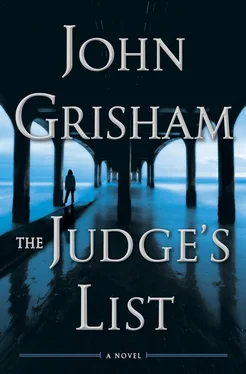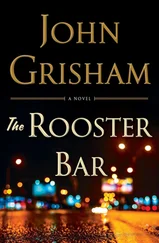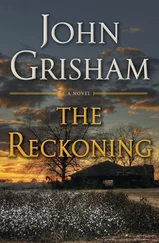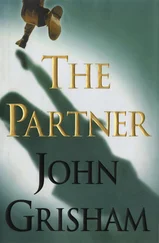They drove past the house. Lacy finally asked, “Was his family prominent?”
“His father was a beloved pediatrician who died at the age of sixty-one. His mother was an eccentric artist who went nuts and died in an institution. The family was fairly well known back then. They were members of the Episcopal church just around the corner. Evidently it was a nice, cozy little neighborhood.”
“Any allegations that he was molested by Thad Leawood?”
“None. And no evidence of it. As I said yesterday, Lacy, I have no evidence. Only assumptions based on unfounded theories.”
Lacy almost said something sarcastic but let it go. They turned onto a wider street and drove for a few minutes with no conversation. Jeri turned and the streets were narrower, the houses smaller, the lawns not as well manicured. She pointed to her right and said, “Up there, the white frame house with the brown pickup. That’s where the Leawoods lived. Thad grew up there. He was fifteen years older than Ross.”
They drove past the house. Lacy asked, “Who lives there now?”
“Don’t know. It’s not important. All the Leawoods are gone.”
Jeri turned at an intersection, then zigzagged away from the residential areas. They were on a busy highway headed north. Finally, Lacy asked, “So how much longer is the tour?”
“We’re getting there.”
“Okay. As we drive around, mind if I ask some questions?”
“Sure. Anything.”
“The crime scene, up in Signal Mountain, and the investigation. What do you know?”
“Almost nothing. The killing was in an area that was popular with joggers and walkers, but there were no witnesses. According to the autopsy, the time of death was between seven and eight p.m., on a warm day in October. Leawood punched the clock at the warehouse at five-oh-five, the usual time, and left. He lived alone and kept to himself, very few friends. A neighbor saw him jog away from his apartment around six thirty, and as far as the police know, that was the last he was seen. He lived at the edge of town, not far from where the walking trail begins.”
The traffic thinned as they left the sprawl of Pensacola. A sign read: cullman, 8 miles.
Lacy said, “I take it we’re going to Cullman.”
“Yes. We’ll cross into Chavez County in about two miles.”
“Can’t wait.”
“Be patient, Lacy. This is not easy for me. You’re the only person I’ve confided in and you have to trust me.”
“Back to the crime scene.”
“Yes, back to the crime scene. The police found nothing. No hairs or fabrics, no blunt instrument, nothing but the nylon rope around his neck, tied off with the same knot, a double clove hitch.”
“And it was the same type of nylon rope?”
“Yes. Identical to the others.”
A sign informed them that they were now in Chavez County. Lacy asked, “We’re dropping in on Judge Bannick?”
“No we are not.”
They turned onto a four-lane highway and began passing the sprawl of Cullman: fast-food restaurants, travel motels, shopping centers.
Lacy asked, “So, what did the police do?”
“The usual. They dug around, went door to door, talked to other joggers and walkers, and coworkers, found a friend or two. Searched his apartment, nothing was missing, so they ruled out robbery as a motive. They did their best but got nowhere.”
“And this was 1991?”
“Yes. A very cold case with no clues.”
Lacy was learning patience and took deep breaths between questions. “I’m sure you have all of this in a file.”
“I do.”
“How do you gather this information from the police? They are notoriously protective of their files.”
“Freedom of Information requests. They’ll comply to some degree, but you’re right, they’ll never give you everything. All they have to do is claim it’s an ongoing investigation and slam the door. However, with the old cases they sometimes relax a little. That, plus I go talk to them.”
“Doesn’t that leave a trail?”
“It could.”
They turned off the highway onto an exit ramp and followed a sign pointing toward the historic downtown. “Ever been to Cullman?” Jeri asked.
“I don’t think so. I checked last night, and BJC has not had a case here in the past twenty years. Several in Pensacola, but things have been quiet in Chavez County.”
“How many counties do you cover?”
“Too many. We have four investigators in the Tallahassee office and three in Fort Lauderdale. That’s seven for sixty-seven counties, one thousand judges, six hundred courtrooms.”
“Is that enough?”
“For the most part. Thankfully, the vast majority of our judges behave, with only a few bad apples.”
“Well, you’ve got one here.”
Lacy did not respond. They were on an extended section of Main Street. Jeri turned off of it, turned again, and paused at an intersection. Across the road was an entrance to a gated community. Behind the gate were modern homes and condos with small neat lawns.
Jeri said, “Dr. Bannick bought this land raw forty years ago and it was a good investment. Ross lives in there, and this is as close as we’ll get. There are a lot of surveillance cameras.”
“I’m close enough,” Lacy said, and wanted to ask about the benefits of knowing where he lived. But she held her tongue. As they drove away she said, “Let’s get back to the local police up there. How do you talk to them without worrying about leaving a trail?”
Jeri chuckled and offered a smile, a rare one. “I’ve created a fictional world, Lacy, and in it I am many characters. A freelance journalist, a crime reporter, a private investigator, even a novelist, all with different names and addresses. In this case, I posed as a crime reporter from Memphis, working on a long story about cold cases in Tennessee. Gave the chief my business card, even a phone number and email. Short skirts and a lot of charm can work wonders. They’re all men, you know, the weaker sex. After a few friendly chats they open up, somewhat.”
“How many phones do you have?”
“Oh, I don’t know. At least half a dozen.”
Lacy shook her head in disbelief.
“Plus, you have to remember that this case is all but forgotten. It’s considered ‘cold’ for a reason. Once the police realized they had nothing to work with, they lost interest in a hurry. The victim was not from their town and had no family to poke around and pressure them. The crime seemed thoroughly random and impossible to solve. In some of these cold cases the cops even welcome a fresh set of eyes digging through the file.”
They were back on Main Street, in the historic section. A stately Grecian courthouse came into view, in the very center of the town. The square around it was busy with shops and offices.
“That’s where he works,” Jeri said, looking at the courthouse. “We won’t go in.”
“I’ve seen enough.”
“There are cameras everywhere.”
“Do you really think Bannick would recognize you? I mean, come on. You’ve never met the man and he has no idea who you are or what you’re after, right?”
“Right, but why take the chance? Actually, I walked in one time, years ago. It was the first day of a term and the courthouse was crawling with people, over a hundred prospective jurors summoned for duty. I stayed in the crowd and had a look around. His courtroom is on the second floor, his office just down the hall. It was really weird, almost overwhelming, just being in the same place as the man who killed my father.”
Lacy was struck by the certainty of her words. With no proof, no evidence, she was convinced Bannick was a murderer. And she, Lacy, was expected to get involved and somehow find truth and justice.
They circled the square and left downtown. Jeri said, “I need some coffee. You?”
Читать дальше












